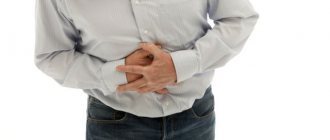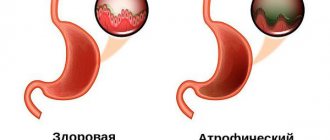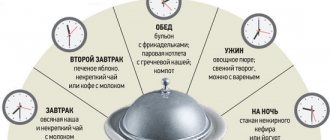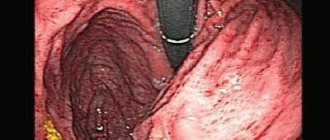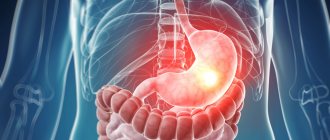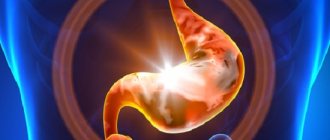Gastritis is divided into several stages; as it develops and without treatment, it flows from one form to another.
The first stage of the disease is superficial gastritis. This form of gastritis is considered the most harmless: inflammation of the gastric mucosa is superficial, there are no focal lesions, and the deep tissues of the stomach and duodenum are not affected. The disease occurs in most cases of treatment and does not fall into the category of dangerous and complex. But at this stage, gastritis must be treated immediately, since it can progress to the next stage, becoming a chronic condition. To prevent this, you need to contact a gastroenterologist in a timely manner.
Pathogenesis
The pathogenesis is based on a long-term inflammatory process in the gastric mucosa, which leads to its gradual structural restructuring. Long-term inflammation is triggered in response to a number of factors, both internal and external.
The inflammatory process develops as a round cell infiltration of neutrophils and other cells of the gastric mucosa involved in its immune system . Against the background of a long process and subsequent structural restructuring, dysregenerative processes are formed, which leads to dystrophy and atrophy . Gastric dysfunction is manifested by either hypo- or achlorhydria and gastric achylia .
Helicobacter pylori infection occupies an important place in the formation of the inflammatory process. The Correa cascade is well demonstrated by changes in the mucosa under the negative influence of H. pylori.
How it develops
The mechanisms causing focal or diffuse type of pathology are as follows:
Chronic diffuse gastritis
- Metabolic and circulatory dysfunctions caused by poor blood flow. The integrity of the lining of the stomach and intestines is compromised, which can be caused by problems with blood vessels, heart failure and hypertension. With antral, diffuse disease and duodenitis (bulbitis), this leads to a reduction in the production of digestive juices. Favorable conditions are created for the growth of bacteria. Helicobacter pylori is activated - a pathogenic microorganism that, with normal immunity, remains dormant for years. In other cases, the disorder is provoked by renal failure, leading to stagnation of fluids and swelling.
- Psychosomatic factors including stress, anxiety and anxiety. Anxiety affects the autonomic nervous system, this negatively affects the mucous membranes of the stomach, leading to spasms and immune disorders. Reduced barrier function causes inflammation, which spreads to the upper intestines and causes duodenitis (bulbitis).
- Reverse outflow of contents – gastric reflux. Pathology occurs as part of duodenitis or antral gastritis. When the pyloric sphincter, which separates the antrum from the intestine, is damaged, partially digested food along with bile flows back into the digestive organ and aggressively affects its lining.
- Activation of Helicobacter pylori. Bacteria multiply in favorable conditions, causing chronic antral gastritis, and with it bulbitis and other forms of inflammation of the mucous membranes. The microorganism destroys thin epithelial cells.
Classification
According to the form of the disease, the disease is classified into:
- Acute superficial gastritis.
- Chronic superficial gastritis . In the absence of timely adequate therapy, the chronic form can turn into atrophic, which is characterized by a high risk of malignancy (transition to oncological forms).
At the location of the inflammatory process:
- the pathological process is localized in the outlet part of the stomach (antrum), which is why it got its name - antral gastritis ;
- damage to the body of the stomach;
- damage to the working day of the body of the stomach - fundic;
- damage to all parts of the stomach - pangastritis .
By scale they distinguish:
- Diffuse superficial gastritis . The diffuse type is characterized by the spread of the inflammatory process throughout the mucous membrane of the organ.
- Focal superficial gastritis . The focal form is characterized by damage to only certain areas of the stomach.
Classification by reason of occurrence:
- Dosage form . Develops as a side effect in response to taking certain medications.
- Endogenous form . It occurs in response to the influence of several internal factors at once.
- Bacterial form . It is formed as a result of the entry into the body of a bacterium such as Helicobacter pylori. According to statistics, in 85% of cases it is this microorganism that causes the development of gastritis.
- Reflux gastritis . It develops in response to the entry of highly acidic and bile from the duodenum into the stomach. This form is considered the most dangerous, because characterized by gradual metaplasia - the transition of cells into a foreign form, and the further development of the oncological process.
Classification by acidity level:
- with normal secretion;
- with increased secretion (hyperacid);
- with reduced secretion (hypoacid).
Reviews and results
Most diseases of the digestive system have a chronic course, and exacerbation is most often associated with errors in nutrition. Chronic gastritis is no exception. Only following dietary recommendations can keep the disease in a state of stable remission. Many patients confirm this and consider the need for mechanical sparing and adherence to food intake to be important.
- “... I was often bothered by heartburn, but I didn’t attach any importance to it. I drank either soda or pharmaceutical drugs for heartburn. When stomach pain, heaviness and belching appeared, I decided to see a therapist. We discovered gastritis (good thing there is no ulcer or erosion) with high acidity. There was no need for hospitalization; treatment was carried out on an outpatient basis. The doctor warned about the need to follow a diet during the exacerbation period. I followed it for one month. Only for the first week I made my own pureed dishes, and then they were no longer pureed, but well-cooked and subdued. Most often I used minced meat. Of course, everything was boiled or baked in foil without a crust - consider it steamed. After such nutrition and treatment, I began to feel great, I didn’t even think that nutrition had such an effect. For a month there was never any discomfort or heartburn”;
- “... Gastritis has been around for many years and I notice that it worsens after stress and if I eat spicy and fried foods. In the fall, there are also often exacerbations. I immediately switch to dietary nutrition, add De-nol or Vikalin and Omeprazole. So far I have managed without a hospital. I normally maintain therapeutic nutrition for 3 weeks, and then expand it a little. I have forever excluded spicy, sour and smoked foods - this makes me feel worse and causes heartburn. Sometimes I can eat fried food, but not much. My wife makes me cutlets, adds a little boiled onion and dill to the minced meat and bakes them in the oven with sour cream. I eat soups more often and sometimes borscht”;
- “... If during an exacerbation you immediately switch to medical nutrition, drink a decoction of chamomile and calendula, Lansoprazole, then in 3 weeks you can restore your stomach. I’ve already learned the diet well, and in a steamer I can quickly make cutlets or boil fish with vegetables. I immediately puree the vegetables and add oil. I eat well mashed porridge and mashed potatoes. Of course, it’s not possible to cook for yourself every day, as recommended. I make soup and cutlets or meat casseroles for 2 days. The only difficulty I see is that I have to take dietary food with me to work and heat it up there.”
Causes
Superficial gastritis develops as a result of prolonged exposure to several negative factors that damage the gastric mucosa.
Main causes of gastritis:
- consumption of alcohol-containing products;
- smoking, nicotine and cigarette tar entering the body;
- taking medications such as NSAIDs, sulfonamides, salicylates;
- non-compliance with the diet, consumption of smoked, salty, fatty foods; excessive presence of fast food in the diet; dry food; binge eating;
- consumption of low-quality, expired products;
- poor chewing of food;
- frequent drinking of coffee on an empty stomach;
- too long breaks between meals;
- excessive salt intake;
- work in hazardous industries (inhalation of lead, microparticles of coal dust);
- love of highly carbonated drinks;
- frequent stress;
- hormonal instability;
- infection with H. pylori from another person;
- ingestion of various acids and alkalis into the stomach.
Reasons that provoke the development of a moderate form of superficial gastritis:
- malfunctions of the immune system;
- hereditary predisposition;
- untreated acute gastritis;
- the presence of infectious diseases that occur in severe form;
- dysfunctional disorder in the work of the sphincter muscle between the stomach and duodenum;
- atherosclerosis , vasculitis and other pathological conditions that disrupt the normal blood circulation of the stomach;
- food poisoning;
- diseases of the renal system;
- pathology of lung tissue, heart;
- anemia;
- rheumatism;
- gout , diabetes mellitus and other endocrine disorders;
- helminthic infestations;
- infection with the causative agent of salmonellosis , dysentery and rotavirus infection .
Symptoms of superficial gastritis
Superficial gastritis can manifest itself symptomatically only during certain periods, as a result of the influence of negative factors on the gastric mucosa.
Main symptoms of the disease:
- a feeling of heaviness in the epigastric region immediately or some time after eating;
- a feeling of compression, burning in the stomach, a feeling of fullness in the abdomen;
- in addition to the feeling of hunger, patients note mild nausea;
- aching, dull pain in the stomach area that occurs immediately after eating, as well as at night;
- the appearance of heartburn after eating “heavy”, fatty foods and consuming alcohol-containing products;
- belching with sour contents;
- noticeable pallor of the skin;
- pain on palpation in the stomach area;
- stool disorders, diarrhea ;
- the appearance of bad breath;
- decreased appetite.
Patients also complain of severe pain in the epigastric region, which occurs in response to eating spicy or too hot food. Most often, this indicates involvement of the duodenum in the inflammatory process.
Below are symptoms indicating the transition of superficial gastritis to an atrophic form:
- refusal to eat, poor appetite;
- noticeable weight loss;
- diarrhea syndrome;
- the appearance of a white coating on the root of the tongue;
- frequent belching of air, mainly in the morning;
- constant nausea;
- vomit;
- severe weakness throughout the body.
Menu (Power Mode)
The longest period of time is therapeutic nutrition during the recovery period and during remission. The complete composition of the diet allows you to constantly adhere to it. We can say that this is a healthy, balanced and moderately gentle diet. The patient’s condition determines the need to wipe foods or the ability to eat them unprocessed.
| Breakfast |
|
| Lunch |
|
| Dinner |
|
| Afternoon snack |
|
| Dinner |
|
| For the night |
|
| Breakfast |
|
| Lunch |
|
| Dinner |
|
| Afternoon snack |
|
| Dinner |
|
| For the night |
|
| Breakfast |
|
| Lunch |
|
| Dinner |
|
| Afternoon snack |
|
| Dinner |
|
| For the night |
|
Tests and diagnostics
If the symptoms described above appear, it is recommended to immediately consult a specialist to carry out diagnostic measures and identify the true cause of poor health.
Basic diagnostic methods:
- Blood test: general and biochemical . Allows you to assess the functional state of internal organs.
- Coprogram . Stool is collected to identify bloody inclusions and signs of internal bleeding .
- X-ray examination of the stomach with a contrast agent . Allows you to identify ulcerative defects , hernias and neoplasms.
- Collection of gastric juice . In dynamics, the study allows you to evaluate secretory activity.
- Fibrogastroduodenoscopy . Thanks to a comprehensive research method, it is possible to assess the condition of the mucous membrane of not only the stomach, but also the duodenum.
- Study of a biopsy of the gastric mucosa. It is possible to identify H. pylori and exclude/confirm cancer.
Prevention
General preventive measures that will help not only avoid the development of superficial gastritis, but also increase the period of remission in patients with an already established diagnosis:
- Changing your lifestyle (observing work, sleep and rest schedules), giving up bad habits.
- If negative symptoms appear, do not self-medicate and consult a specialist in a timely manner. If necessary, issue a sick leave certificate.
- Avoid stressful situations, strive to develop stress resistance.
- Try to eat foods whose temperature is approximately +37 degrees. Products above +60 degrees and below +15 degrees are prohibited.
- Try to consume foods in liquid and crushed form. Preference is given to porridge-like foods and purees.
- Food should be taken 6-8 times a day, and long periods of fasting should not be allowed, after which there is a high risk of overeating.
- The last meal is 2 hours before going to bed.
- The amount of food consumed per day should not exceed 3 kg (30% for breakfast, 15% for second breakfast, 40% for lunch and 15% for dinner).
Treatment
If Helicobacter pylory is detected, a special course of antibiotics is prescribed. To soothe pain and reduce the manifestations of other symptoms, enveloping drugs such as Maalox or Almagel are used. To reduce stomach acidity, if necessary, the drugs Ranitidine or Omeprazole are prescribed. During treatment, you must follow a strict diet, do not consume foods that can irritate the gastric mucosa (alcohol, coffee, hot, smoked, spicy, canned, semi-finished products), prepare food mainly by boiling or steaming. Long breaks in eating should not be allowed; you should try to eat only liquid and pureed food that has undergone heat treatment. Try to eat at the same time, in a calm environment. Stress and nervous disorders should also be avoided; if necessary, sedatives will be prescribed. Do not avoid feasible physical activity; it is necessary to support the motor function of the stomach and intestinal motility.
Diet for superficial gastritis
Diet for superficial gastritis of the stomach
- Efficacy: therapeutic effect after 10 days
- Duration: a month or more
- Cost of products: 1500-1600 rubles. in Week
Patients suffering from chronic superficial gastritis are recommended to follow a special gentle diet, which completely excludes the consumption of dishes and products that have a negative, irritating effect on the gastric mucosa (soda, fast food, smoked meats).
Preference in nutrition should be given to dishes made from lean meats. Cereals should be consumed only in boiled form, vegetables must undergo mandatory heat treatment. Soft-boiled eggs, non-acidic kefir, low-fat pureed cottage cheese, milk, jelly and herbal teas are allowed for consumption.
Fully or partially limited products
- Soups with meat broth, with not pureed vegetables, first courses with cabbage.
- Radishes, radishes, white cabbage, turnips, beans, peas, rutabaga, onions, canned vegetables, sorrel, garlic, mushrooms are excluded from the diet on an ongoing basis - all of them have an irritating effect on the mucous membrane. You should also not eat pickled and pickled vegetables.
- Fruits raw and with peel. Sour or unripe fruits. Even during the period of remission, it is not recommended to consume grapes due to the rough skin and the ability to cause fermentation and melon as a difficult to digest product.
- Millet, pearl barley, corn, barley cereals, legumes, and coarse large pasta are excluded.
- Fresh bread, pastry, puff pastry, brown bread
- Fatty fish and meat (pork, goose, duck, lamb), animal fats, canned meat, sausages and smoked meats.
- Spicy seasonings and dishes, horseradish, mustard, tomato sauce, pepper.
- Chocolate, coffee, cakes, pastries, nuts, ice cream.
- Alcohol, carbonated drinks.
Table of prohibited products
| Proteins, g | Fats, g | Carbohydrates, g | Calories, kcal | |
Vegetables and greens | ||||
| vegetables legumes | 9,1 | 1,6 | 27,0 | 168 |
| swede | 1,2 | 0,1 | 7,7 | 37 |
| cabbage | 1,8 | 0,1 | 4,7 | 27 |
| sauerkraut | 1,8 | 0,1 | 4,4 | 19 |
| green onion | 1,3 | 0,0 | 4,6 | 19 |
| bulb onions | 1,4 | 0,0 | 10,4 | 41 |
| cucumbers | 0,8 | 0,1 | 2,8 | 15 |
| canned cucumbers | 2,8 | 0,0 | 1,3 | 16 |
| white radish | 1,4 | 0,0 | 4,1 | 21 |
| turnip | 1,5 | 0,1 | 6,2 | 30 |
| canned tomatoes | 1,1 | 0,1 | 3,5 | 20 |
| horseradish | 3,2 | 0,4 | 10,5 | 56 |
| spinach | 2,9 | 0,3 | 2,0 | 22 |
| sorrel | 1,5 | 0,3 | 2,9 | 19 |
Mushrooms | ||||
| mushrooms | 3,5 | 2,0 | 2,5 | 30 |
Cereals and porridges | ||||
| corn grits | 8,3 | 1,2 | 75,0 | 337 |
| pearl barley | 9,3 | 1,1 | 73,7 | 320 |
| millet cereal | 11,5 | 3,3 | 69,3 | 348 |
| barley grits | 10,4 | 1,3 | 66,3 | 324 |
Confectionery | ||||
| candies | 4,3 | 19,8 | 67,5 | 453 |
Ice cream | ||||
| ice cream | 3,7 | 6,9 | 22,1 | 189 |
Cakes | ||||
| cake | 4,4 | 23,4 | 45,2 | 407 |
Raw materials and seasonings | ||||
| mustard | 5,7 | 6,4 | 22,0 | 162 |
| ginger | 1,8 | 0,8 | 15,8 | 80 |
| ketchup | 1,8 | 1,0 | 22,2 | 93 |
| mayonnaise | 2,4 | 67,0 | 3,9 | 627 |
| ground black pepper | 10,4 | 3,3 | 38,7 | 251 |
| chilli | 2,0 | 0,2 | 9,5 | 40 |
Dairy | ||||
| kefir | 3,4 | 2,0 | 4,7 | 51 |
Meat products | ||||
| pork | 16,0 | 21,6 | 0,0 | 259 |
| ham | 22,6 | 20,9 | 0,0 | 279 |
Sausages | ||||
| dry-cured sausage | 24,1 | 38,3 | 1,0 | 455 |
| sausages | 10,1 | 31,6 | 1,9 | 332 |
| sausages | 12,3 | 25,3 | 0,0 | 277 |
Bird | ||||
| smoked chicken | 27,5 | 8,2 | 0,0 | 184 |
| duck | 16,5 | 61,2 | 0,0 | 346 |
| smoked duck | 19,0 | 28,4 | 0,0 | 337 |
| goose | 16,1 | 33,3 | 0,0 | 364 |
Fish and seafood | ||||
| dried fish | 17,5 | 4,6 | 0,0 | 139 |
| smoked fish | 26,8 | 9,9 | 0,0 | 196 |
| canned fish | 17,5 | 2,0 | 0,0 | 88 |
Oils and fats | ||||
| animal fat | 0,0 | 99,7 | 0,0 | 897 |
| cooking fat | 0,0 | 99,7 | 0,0 | 897 |
Non-alcoholic drinks | ||||
| bread kvass | 0,2 | 0,0 | 5,2 | 27 |
| * data is per 100 g of product | ||||
Consequences and complications
The early form of the disease is antral superficial gastritis. In the absence of adequate treatment, non-compliance with diet therapy and refusal to lead a healthy lifestyle, certain complications may develop:
- formation of pangastritis , in which the inflammatory process spreads to all parts of the stomach;
- involvement of the duodenum in the pathological process, erosive lesions, bulbitis , acute gastroduodenitis ; in advanced cases, a non-scarring open ulcerative defect is diagnosed;
- development of reflux with the reflux of contents from the duodenum into the stomach, and from the stomach into the esophagus;
- development of colitis , adhesive disease ;
- bleeding from ulcerative defects and erosions.

